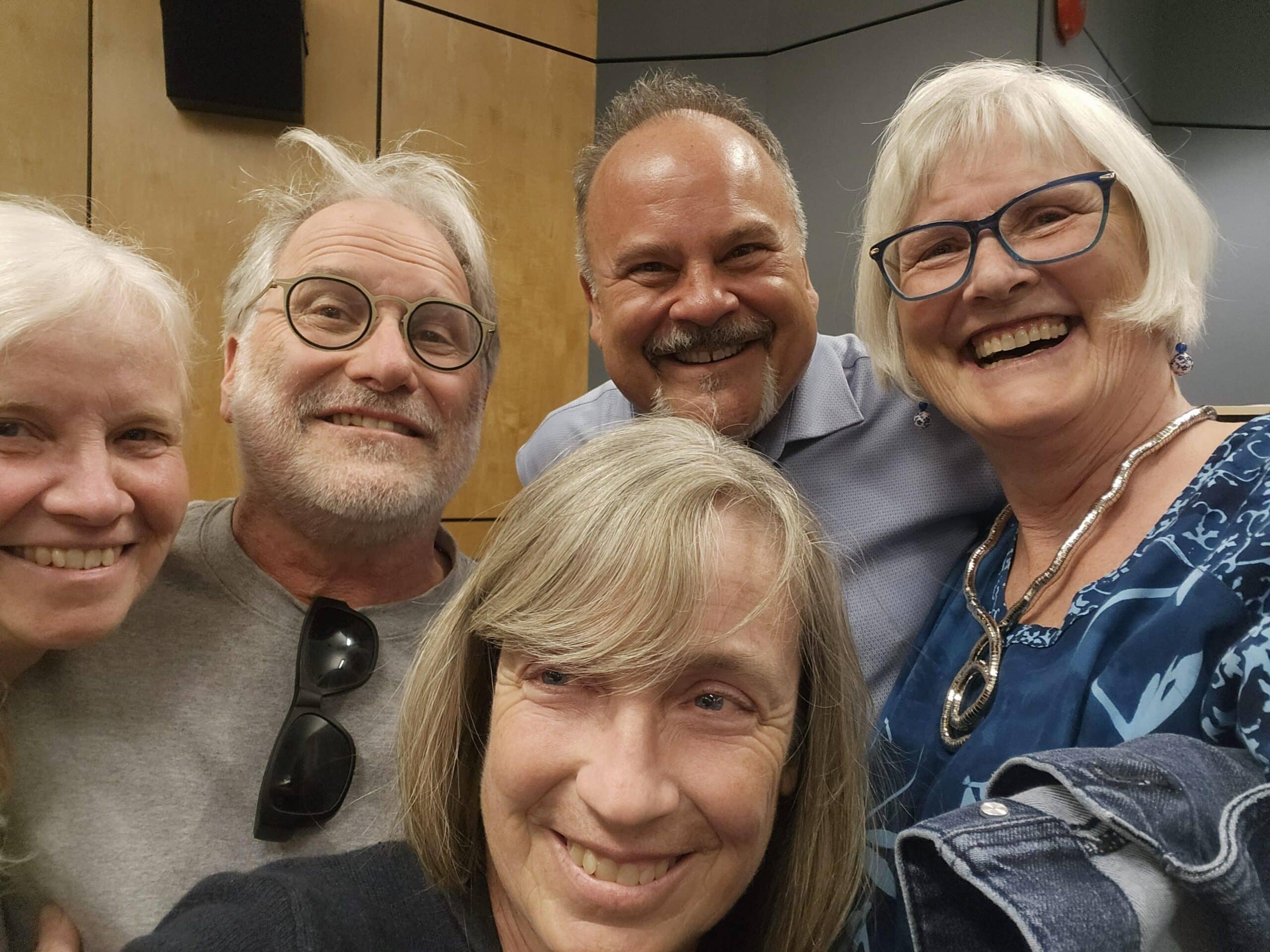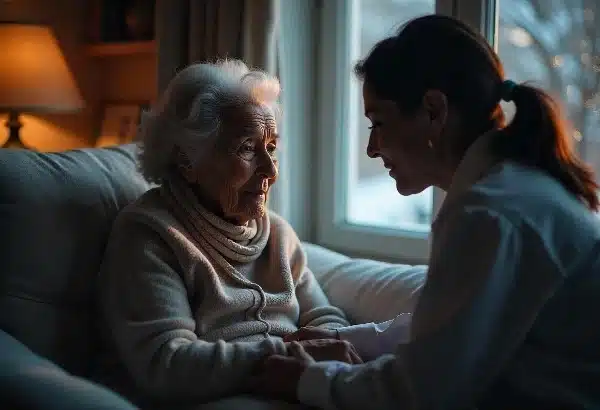National Grief and Bereavement Day is a time to reflect on the profound impact of loss and the vital role of community support during times of grief. This day prompts us to recognize the universal nature of loss, the individual experience of grief, and the power of collective empathy and care facilitated by communities.
This blog explores the crucial role that communities play in providing grief support. It offers guidance on how to support those experiencing loss, highlights the importance of palliative care training and the resources available to help and empower communities to provide compassionate, respectful support—not only on this day but throughout the entire grieving journey.
The Crucial Role of a Community in Grief and Bereavement Support
National Grief and Bereavement Day acts as a solemn reminder of the shared experiences of loss and the universal need for compassion. It brings to light the importance of community networks that enhance the work of individual caregivers by offering a broad spectrum of emotional and practical support. For those engaged in palliative care, this day reaffirms the vital role of community support to provide comprehensive care that addresses both the heart and the spirit.
An Illustration of Informed Caregiving: An Essential Part of a Compassionate Community
Informal caregiving is an essential part of a compassionate community as we can all offer support in our own way.
A woman named “Mags” provides an incredible example of showing concern and sharing knowledge of community resources with an individual who she supported at work. A server who works in a busy restaurant and bar, Mags noticed that a regular customer was distressed and drinking to excess. Mags took the time to learn about the customer’s recent death of her partner and how this had impacted her emotional and mental well-being. She had attended hospice palliative care training on how to be a support to those who are mourning the loss of a loved one. Showing concern, and using knowledge she had learned, she shared information about grief supports in their community and even offered to accompany the individual to a grief support circle.
7 Ways to Support the Grieving and Foster a Caring Community
Practical suggestions to help support those grieving include:
- Listen: Give your full attention, be comfortable with silence, and use phrases like “mm-hmm” or “tell me more.”
- Validate: Acknowledge the person’s pain and experiences.
- Show empathy and compassion: “I am here with you…. That sounds painful….”
- Offer meaningful support: Consider the needs, and suggest things that you can do to help, “I like to make soup, can I bring you a bowl and we can eat lunch together” or, “I love to make soup, can I leave a bowl at your door?”
- Avoid judgment: Refrain from judging the person’s way of grieving. Every person grieves in their own way.
- Avoid offering advice or minimizing their grief.
- Learn about loss and grief: Become grief literate and learn about the complex, personal experience of grief and how to respond with understanding, compassion, and empathy.
- Connect with resources: Gain and share information about support groups, counseling, websites, brochures, books, just as Mags did in our earlier example.
Elevate Community Engagement
Palliative care transcends the mere treatment of physical symptoms. It encompasses the psychological and emotional support that communities are uniquely positioned to provide. Palliative care training equips and empowers communities to be sources of strength and guidance for those grieving whilst fostering compassionate support within their communities.
Building Emotional and Psychological Resilience
The training associated with palliative care prepares caregivers and communities to adeptly navigate the complex emotional landscapes of those in grief. This education involves a deep understanding of grief, equipping them with the ability to respond thoughtfully to the needs of the bereaved and foster a communal path to healing.
Facilitating Effective Communication
Communication lies at the heart of community support, making it crucial for fostering an environment where individuals feel safe to express their grief. Palliative care training strengthens this aspect by teaching the art of compassionate dialogue, ensuring that all voices are heard and respected.
Personalizing Community Support
Each community experiences and expresses grief differently, influenced by a myriad of cultural, spiritual, and personal factors. This training helps individuals within the community to recognize and respect these differences and guide tailored support initiatives that honor the unique ways in which communities grieve.
Palliative Care Training and Resources
A wide range of palliative care training programs and resources are available to equip members of the community with the skills to provide compassionate support to those in times of grief and bereavement. These include:
Workshops and Courses
Palliative care training for Personal Support Workers (PSWs), and for all members of the health care team helps develop competencies to provide palliative care. However, for individuals in the community who are not health care workers, these same workshops and courses offer advice in communication and help to provide compassionate care and personalized support to meet the needs of those grieving.
Textbooks and Online Materials
A wealth of written resources, such as the Life and Death Matters texts, podcasts and videos, helps communities to understand grief and best practices.
Supportive Community
Training programs may also broaden an individual’s network to caregivers and healthcare providers. They bring much experience and advice, and can further enhance a supportive community for those who are grieving.
The Significance of Grief Literacy in Community Support
Grief literacy plays a fundamental role in enhancing community care strategies and supporting those who are grieving with collective kindness. This knowledge is vital to understand the bereavement process and establish best practices to support individuals in grief. On National Grief and Bereavement Day, promoting grief literacy is paramount. It empowers caregivers and community members to offer informed and heartfelt support.
Closing Thoughts
As we observe National Grief and Bereavement Day, the emphasis on community support for those grieving is more pertinent than ever. By continuing to invest in palliative care training and resources for palliative care, we ensure that this compassionate approach remains a cornerstone of the support systems within our communities. It offers a beacon of hope and solace that extends well beyond the confines of a single day.
Whoever you are and wherever you find yourself, you have the power to make a difference to someone nearby who may be feeling lost and in need of support. Grief touches all of us at some point in our lives. – By becoming more aware of how and when to offer support – to a neighbor, a friend, or even a stranger we can profoundly make a difference to the lives of others. This act of caring not only helps the grieving person, but also positively impacts us and enriches our own personal well-being and sense of serving a greater purpose.
Palliative care resources
Life and Death Matters offers a library of palliative care resources designed to educate and inspire communities on grief and compassionate support practices. Learn more
References:
- National Grief and Bereavement Day – CHPCA
- Palliative care
- https://waltherglobalpalliativecare.iu.edu/resources/international-resources/doc-files/wpca_global_atlas_of_palliative_care_2014.pdf?form=MG0AV3
- https://www.compassionatefriends.org/find-support/?form=MG0AV3
- https://www.healthline.com/health/mental-health/online-grief-support-groups?form=MG0AV3#1
- https://www.griefshare.org/findagroup?form=MG0AV3
- https://www.healthline.com/health/mental-health/online-grief-support-groups?form=MG0AV3








